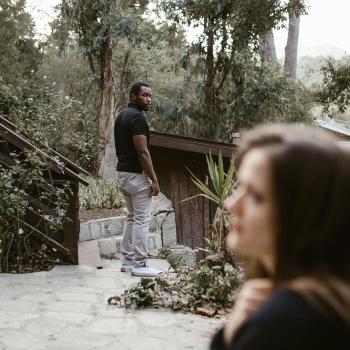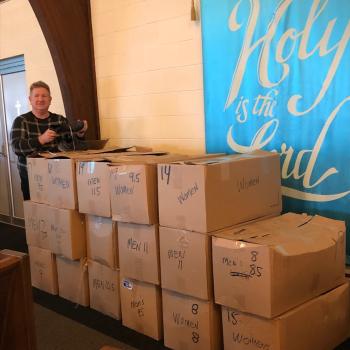
Scripture: Daniel, chapters 5-6; Psalm 130; Luke, chapter 3
Daniel 5:18-31 (NASB) – “O king, the Most High God granted sovereignty, greatness, honor, and majesty to Nebuchadnezzar your father. Now because of the greatness which He granted him, all the peoples, nations, and populations of all languages trembled and feared in his presence; whomever he wished, he killed, and whomever he wished, he spared alive; and whomever he wished he elevated, and whomever he wished he humbled.
But when his heart was arrogant and his spirit became so overbearing that he behaved presumptuously, he was deposed from his royal throne, and his dignity was taken away from him. He was also driven away from mankind, and his heart was made like that of the animals, and his dwelling place was with the wild donkeys. He was given grass to eat like cattle, and his body was drenched with the dew of heaven, until he recognized that the Most High God is ruler over the realm of mankind, and that He sets over it whomever He wishes.
Yet you, his son, Belshazzar, have not humbled your heart, even though you knew all this, but you have risen up against the Lord of heaven; and they have brought the vessels of His house before you, and your nobles, your wives, and your concubines have been drinking wine out of them; and you have praised the gods of silver and gold, of bronze, iron, wood, and stone, which do not see, nor hear, nor understand. But the God in whose hand are your life-breath and all your ways, you have not glorified.
Then the hand was sent from Him and this inscription was written out. Now this is the inscription that was written: MENE, MENE, TEKEL, UPHARSIN.
This is the interpretation of the message: MENE – God has numbered your kingdom and put an end to it.
TEKEL – you have been weighed on the scales and found deficient.
PERES – your kingdom has been divided and given to the Medes and Persians.”
Then Belshazzar gave orders, and they clothed Daniel with purpose and put a necklace of gold around his neck, and issued a proclamation concerning him that he now had authority as the third ruler in the kingdom.
That same night Belshazzar the Chaldean king was killed. So Darius the Mede received the kingdom at about the age of sixty-two.
Observations: Several themes emerge from this passage. First, we have the background of the story of Nebuchadnezzar. Specifically, this passage refers back to chapter 4, and the period of Nebuchadnezzar’s “exile” among the animals. (See Daniel 4, and my post from September 12, “It Is You, O King.”) We also have the account of “the writing on the wall,” which has become a catchphrase for anything that signals an impending judgment or disaster. That story begins with Belshazzar, Nebuchadnezzar’s son and the reigning king, throwing a party. Daniel paints a picture of drunkenness and debauchery (see 5:1-4). Finally, Belshazzar calls for the gold vessels that had been taken from the Temple in Jerusalem to be brought. He and his party guests proceed to drink out of those vessels, “and praise the gods of gold and silver, of bronze, iron, wood, and stone.”
At that point a hand appears and writes on the wall. No one understands what is written or what it means. “Then the king’s face became pale and his thoughts alarmed him, and his hip joints loosened and his knees began knocking together” (5:6). He’s scared; who wouldn’t be? He sees something that he’s never seen before, that no one has seen before, and no one understands it. So he calls for all his advisers and offers a great reward to anyone who can explain all this. But no one can.
In verse 10, Daniel tells us that “the queen” entered the banquet hall and began to speak. “The queen” in question is Belshazzar’s mother, not his wife. Verses 2-3 tell us that the king’s wives were there at the party drinking wine with the other guests. Thus, when “the queen” enters the banquet hall in verse 10, the reference must be to someone other than one of “his wives.” This seems to be confirmed by the fact that “the queen” remembers the events of Nebuchadnezzar’s “exile” – and she remembers Daniel. She reminds Belshazzar about Daniel, and Belshazzar summons Daniel to the hall.
You can imagine Daniel walking into the great banquet hall. All of the guests – who had been drinking heavily – are now quiet. They’ve been shaken to their core by what has happened. Meanwhile, Daniel looks around. I picture him shaking his head slowly. The sight of the sacred vessels from the Temple in that setting saddens him. The king tells him of the great reward that will be his if Daniel can interpret this event: clothed with purple, a necklace of gold, and authority as the third ruler in the kingdom.
“Keep your gifts for yourself or give your rewards to someone else; however, I will read the inscription to the king and make the interpretation known to him” (5:17). Daniel is not interested in the rewards; Daniel’s only concern is to honor God. He proceeds to give the speech that I’ve set forth above, and the phrase that stands out to me today is “even though you knew all this.” Belshazzar had to have known about what had happened to his father, but instead of honoring God, he mocked Him. He lifts one of the gold cups from the Temple and makes a toast to his gods of gold and silver, wood and stone.
And God said, “That’s it!” The writing was on the wall. And that same night Belshazzar the Chaldean king was killed. So Darius the Mede received the kingdom at about the age of sixty-two.
Application: We take heart in the fact that God is merciful. He is rich in mercy and slow to anger. We praise Him for all the mercy He has shown us. We are grateful that His mercy continues to provide opportunities for others to repent and turn to Him. However, we must not lost sight of the fact that there will be a time of judgment. We often think of this in terms of the final judgment, at the end of time, and that day is coming. But this passage reminds us that there are times of judgment that individuals face each day. Decisions have consequences, and at some point those consequences come to pass. That’s what happened with Belshazzar – because even though he knew what had happened to his father, he refused to glorify the one true God.
Prayer: Father, thank you for your mercy. You are rich in mercy and slow to anger, but that doesn’t mean that we can presume upon your mercy. Like Belshazzar, we know about Your great works. Help us not to follow his example by refusing to glorify You. As Daniel said, our life, our breath, and all of our ways are in Your hands. That’s a comforting reminder! In the midst of a ever-darkening world, You are our light. Help us to walk in Your light, so we may be faithful to you as Daniel was. We know You; may it never be said of us, “even though you knew.” Amen.
















